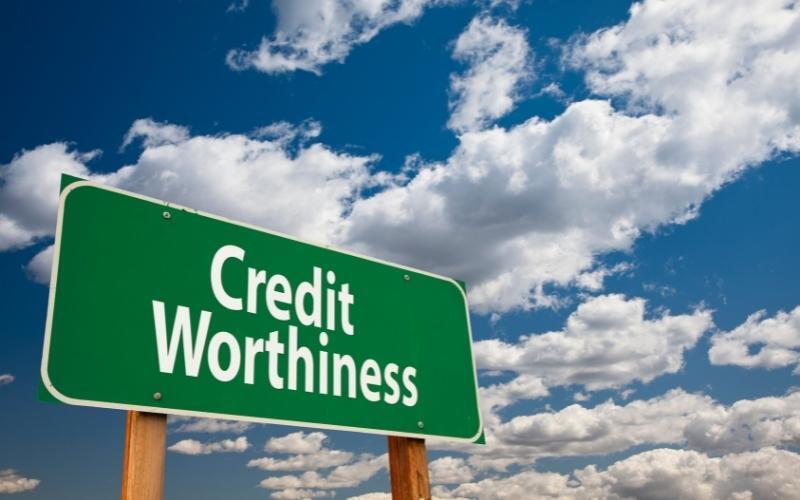Last Updated: April 2, 2024
Credit Score vs. Credit Worthiness

Many believe that a high credit score is the golden ticket to financial prosperity, but does it truly reflect your financial health? Diving into the intricate world of credit, we unravel the often-conflated concepts of credit score and creditworthiness.
Understanding the nuances between these can be your first step towards not just managing debt better but also planning a financially sound future. We'll dissect the intricate relationship between these concepts, shedding light on common myths and illuminating the path toward true financial understanding, ensuring that you're not just chasing numbers but building a foundation for financial success.
What is a Credit Score?
A credit score is based on your credit report. Basically, all of your creditors, and possibly your landlord, report to one or more of three agencies. These are Experian, TransUnion, and Equifax. These companies then rate your credit report using individual algorithms.
The number generated by the algorithms is your credit score. The numbers will vary slightly among the three agencies because not all debt is reported to every company.
The companies look at five factors; payment history, credit utilization ratio, age of credit, credit mix, and recent applications. We will take a quick look at each but for more information, check out The 5 Main Credit Score Factors. To understand the nuances between these scores, read more about the difference between FICO scores and credit scores, and why this distinction matters.
Payment history looks at how well you have done making on-time payments, in full, toward each of your debts. This single factor represents 35% or slightly over ⅓ of your credit score. It is extremely important that you make your payments on-time, every time. And it is the fastest way to wreck your credit.
Credit utilization ratio compares how much credit you have on a revolving account like a credit card and how much of that you are using. This accounts for 30% or just under ⅓ of your credit score. Another fast way to improve your credit score is to pay down your revolving debt.
The remaining three factors represent the remaining ⅓ of your score. Age of credit (15%) is simply how old your different accounts are. The older the better and the only way to improve this is time and leaving old, paid off credit open. That’s why you may not want to close a credit card account that you’ve paid off and decided not to use anymore.
Credit Mix
Credit mix (10%) puts emphasis on having different types of credit. For instance, a car loan and a credit card, and rent payments are ranked more highly than just a credit card. The final 10% is recent applications. Every time you apply for credit, such as filling out a credit card application, your credit score suffers a slight, temporary decrease. Don’t apply for credit cards just to get the discount at the register. Not only do you risk running up debt, but future creditors look at recent applications dubiously as it suggests you have some financial changes coming.
Having a mix of different credit types demonstrates you can responsibly manage different types of accounts.
This includes:
- Revolving credit such as credit cards
- Installment loans like student loans, personal loans, auto loans
- Mortgage loans
- Retail credit accounts
- Rent payments
A healthy credit mix might include an auto loan, mortgage, student loan, and 1-2 credit cards. It's best to have both installment and revolving accounts rather than just one type. Not only do potential lenders look at credit score, but so do potential employers. Your credit score may suggest whether or not you are a good financial risk for their business.
What Do Credit Repair Companies Do?
A reputable credit repair company will pull your credit report from each of the three agencies and review it for mistakes. They then work to get the mistakes removed. In some cases, these mistakes are hurting your credit score. The Federal Trade Commission estimates that 1 in 4 (25%) of consumers have at least one error that affects their credit scores.
You can pull your credit report and dispute any errors yourself. Learn more about credit repair companies, scams, and DIY credit repair in this article.
Creditworthiness and What It Means
We’ve defined creditworthiness as a measure of how well you repay your debts. The higher your credit score, the more creditworthy you are perceived to be and the easier you will be approved for additional credit.
You can be wealthy and have poor credit scores and history and be deemed ‘not creditworthy.’ Alternatively, you can be poor but have handled your debt well and be very creditworthy. It’s not how much money you have, it is how you handle your debt.
In general, the larger the debt you are applying for, the more proof of creditworthiness you will be required to demonstrate. It is far more probable to get a credit card with a poor credit score, but not a mortgage or a car loan.
Credit scores range from 300 to 850, depending on which algorithms are used. There are two - FICO and VantageScore. They are roughly the same. Many major creditors use FICO scores, but VantageScore is catching up in popularity and use.
FICO vs. VantageScore Ranges
| FICO | VantageScore |
|---|---|
| 800-850 Exceptional | 781-850 Excellent |
| 740-799 Very Good | 661-780 Good |
| 670-739 Good | 601-660 Fair |
| 580-669 Fair | 500-600 Poor |
| 300-579 Poor | 300-499 Very Poor |
Monitoring Your Credit Report
It's important to monitor your credit report regularly to ensure there are no errors or fraudulent activity. You can obtain free credit reports from each of the three major credit bureaus once per year at annualcreditreport.com. It's recommended to space these out and get one every 4 months so you can monitor throughout the year.
You should also consider signing up for credit monitoring services that track your credit report and alert you to any changes. While there is often a monthly fee, the protection against identity theft and the ability to dispute errors quickly can be worthwhile.
Building Your Creditworthiness
If you currently have poor credit or no credit history, there are steps you can take to build your creditworthiness over time.
Here are Some Steps:
- Become an authorized user on someone else's credit card - this allows their positive history to be reflected on your credit report. Just be sure they have a good payment history.
- Apply for a secured credit card - this requires a deposit as collateral but helps demonstrate responsible usage.
- Take out a credit building loan - these are designed for people with no/poor credit to make monthly payments and establish a history.
- Limit credit checks by only applying for what you need - too many inquiries can negatively impact your score.
- Always pay at least the minimum on time - late payments severely hurt your creditworthiness.
FAQs
Conclusion
Your credit score is a very important way to demonstrate how responsible you are with debt. The better your credit score, the higher your creditworthiness is assumed to be. It is possible to improve your credit score and creditworthiness by paying bills on time and paying down debt. It takes time, but it is worth the effort. For specific strategies for improving your credit score, you might want to explore these methods to elevate your credit score by over 100 points.
While having a high credit score in the "good" to "excellent" range will make it much easier to obtain new credit, you should also focus on having a healthy financial life overall. Having good financial habits goes hand in hand with building your credit. The higher your creditworthiness, the more opportunities you'll have to access credit on good terms, but don't lose sight of your complete financial health.
In addition to your credit score, lenders may look at other factors like your income, assets, employment history, and existing debts when making lending decisions. Building and maintaining strong credit takes diligence and responsible financial behavior over time. By monitoring your credit report, managing credit wisely, and paying bills on time consistently, you can be on the path toward creditworthiness. Part of this process involves understanding how often your credit score updates, so you can effectively track your progress and plan your financial actions.
If you would like more information about improving your own credit score, contact us today!
Pacific Debt Relief is not a credit repair organization nor does our program aim to improve your credit score. The information below is for educational purposes to help consumers make informed decisions as it relates to credit and debt.
✔ Accredited by Better Business Bureau with BBB A+ rating (4.93 rating and 1678 reviews)
✔ US News and World Reports and Bankrate ranked Pacific Debt Relief as one of “The Best Debt Relief Companies of 2024”
✔ 6.9 star rating by BestCompany.com (over 2379 client reviews)
✔ 4.8 star rating by TrustPilot based (over 1613 verified consumer reviews)
✔ ConsumerAffairs.com Accredited (over 544 verified reviews with an average rating of 5 stars)
✔ A Top 10 Rated Compan by TopTenReviews.com , ConsumersAdvocate.com and Top10debtconsolidation.com
✔ 4.6 star rating by Google (229 client reviews)
✔ 100% rating by SuperMoney (9 client reviews)
Reduce Your Credit Card Debt By Up to Half

BBB Reviews | 4.9/5.0 Rating









 Do Not Sell My Personal Information
Do Not Sell My Personal Information